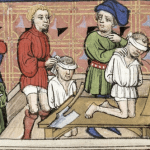 Weird Stuff
Weird Stuff  Weird Stuff
Weird Stuff  Miscellaneous
Miscellaneous 10 LEGO Facts That Will Toy with Your Mind
 Misconceptions
Misconceptions 10 Widespread Historical Myths and the Texts That Started Them
 Crime
Crime 10 Incredible Big-Time Art Fraudsters
 Movies and TV
Movies and TV 10 Most Influential Fictional Objects in Cinema History
 Our World
Our World Top 10 Real Almost‑Cities That Never Materialized
 Technology
Technology 10 Unsettling Ways Big Brother Is (Likely) Spying on You
 Music
Music 10 Chance Encounters That Formed Legendary Bands
 Space
Space 10 Asteroids That Sneaked Closer Than Our Satellites
 Sport
Sport The 10 Least Credible Superstars in Professional Sports
 Weird Stuff
Weird Stuff 10 of History’s Greatest Pranks & Hoaxes
 Miscellaneous
Miscellaneous 10 LEGO Facts That Will Toy with Your Mind
 Misconceptions
Misconceptions 10 Widespread Historical Myths and the Texts That Started Them
Who's Behind Listverse?

Jamie Frater
Head Editor
Jamie founded Listverse due to an insatiable desire to share fascinating, obscure, and bizarre facts. He has been a guest speaker on numerous national radio and television stations and is a five time published author.
More About Us Crime
Crime 10 Incredible Big-Time Art Fraudsters
 Movies and TV
Movies and TV 10 Most Influential Fictional Objects in Cinema History
 Our World
Our World Top 10 Real Almost‑Cities That Never Materialized
 Technology
Technology 10 Unsettling Ways Big Brother Is (Likely) Spying on You
 Music
Music 10 Chance Encounters That Formed Legendary Bands
 Space
Space 10 Asteroids That Sneaked Closer Than Our Satellites
 Sport
Sport The 10 Least Credible Superstars in Professional Sports
Ten Long-Dead People Who Are Still Messing Up Today’s World
Humanity has been in freefall for years. That’s what it feels like, at least. Wars, economic crashes, and a global pandemic haven’t exactly been encouraging. Of course, in many (most?) ways, life is better now than it ever has been. Technology has totally changed our world. But that doesn’t mean there aren’t serious issues still sticking around in society. And who should we blame for them? Dead people, of course!
We’re being a bit cheeky there, but the interesting thing to think about is that a lot of long-dead famous people actually caused such massive changes in their lifetimes that we still feel the effect of their existence in the modern world. In this list, we’ll take a look at ten of those people. These infamous historical figures have all been dead for a while, but the things they did during their lifetimes are still affecting us in very, very negative ways.
Related: Top 10 Things You Wouldn’t Believe Influence Crime
10 Adolf Hitler
It should be no surprise that Adolf Hitler is the first one on this list. His actions leading up to and during World War II are worth putting him on it alone. The atrocities he committed with the Nazi Party in Germany at that time are still front of mind for a great many people worldwide. But in the long run, Hitler has had even more of an impact on society than we might care to admit. Today, unfortunately, neo-Nazi groups have survived all over the western world. Some have even thrived in various parts of the United States and Europe.
The internet has made it much easier for Neo-Nazi groups to align with each other and communicate amongst themselves, too. And even today, they still celebrate significant Nazi-related days and anniversaries—like Hitler’s birthday. Even as horrific as the Holocaust was, some people simply can’t seem to give up the ideology that led to it. And that’s something that should concern all of us.
It’s not just that, either. Unfortunately, Hitler’s impact on politics in Germany is still very much felt in that nation. Even decades after his death near the end of World War II, Hitler is still front-of-mind for many Germans who lived through the war and many others who are descendants of those people. There were millions of Nazi Party supporters in the 1930s and 1940s, after all. Those people didn’t just disappear overnight. Instead, the country had to find a way to re-integrate them into society. Sadly, that led to decades and decades worth of rifts between families, friends, and citizens in communities all over Germany.[1]
9 Charles Darwin
You might not expect to see Charles Darwin on this list, but here he is! The issue isn’t so much his groundbreaking work on evolution but how it’s been misunderstood in the decades and centuries since his passing. When Darwin first published his research in 1859, it was highly controversial. However, he had been collecting evidence for over 20 years prior to that. So he had plenty of proof. The problem was that his argument was complex, and many people didn’t fully understand it. In fact, many people STILL don’t fully understand it!
One example is the link between primates and humans. People had long wondered if there was a connection, even before Darwin came along. Even as he released On the Origin of Species, other biologists were publishing misleading drawings that inaccurately connected primates and humans. This made it easy for people to misinterpret Darwin’s work on the subject. And in time, many twisted it to fit their own beliefs. After Darwin died in 1882, this misinterpretation only grew.
In modern-day America, many right-wing Christian groups have pushed back against the teaching of evolution. In 2013, a study by the Pew Research Center found that only about 60% of Americans accepted Darwin’s views on evolution. Sadly, creationists have used this gap to reignite the debate, and as many as a third of Americans side with them. Even more troubling, some state lawmakers have pushed for creation science to be taught in schools. Despite more than 150 years of scientific backing, Darwin’s theory of evolution is still a hotly debated topic. So much for the science being settled, right?[2]
8 Henry VIII
Henry VIII is famous for many things… especially for executing two of his wives. However, his biggest legacy, which is still felt today, is how he broke away from the Catholic Church. He wanted to divorce and remarry way back in the middle of the 16th century, and the Church wouldn’t allow it. So he created his own Church of England. Henry, who died in 1547, had been a devout Catholic during his life. But unfortunately for him, his breakup actions didn’t align with the Church’s rules. (No comment on the executions…)
His break from the Church had big consequences, especially in Ireland. Henry put pressure on Ireland during his life to give up its Catholic beliefs. This didn’t sit well with Irish leaders. So, in 1534, Lord Offaly of Kildare led a Catholic rebellion against Henry. The English responded with force, and that violent occupation left scars that lasted for literal centuries.
Even long after Henry’s death, that religious divide continued. Leaders like Oliver Cromwell dealt with the fallout, for one. But even today, it’s still a major issue in Northern Ireland. Fairly often, even now, Protestant parades in cities like Belfast lead to clashes with Catholics. Violence isn’t uncommon. With nearly equal numbers of Protestants and Catholics, tensions are high, and each side is deeply rooted in their beliefs.
The effects of Henry’s decisions even show up in modern politics. Take Brexit, for example! Northern Ireland was split between those wanting to leave the European Union and those wanting to stay, and religious beliefs played a role as a dividing line. It’s crazy to think about, but Henry’s desire to marry who he wanted started a conflict that is still nearly five full centuries later.[3]
7 James Madison
James Madison is one of America’s most important Founding Fathers. As the first person to really settle in and draft the Constitution, he holds a special place in America’s heart. But interestingly, he is also very much still leading to a major fight in America—the fight over gun control. See, Madison wanted very much to allow citizens the right to bear arms. He specifically was the man who proposed and then wrote the Second Amendment to the United States Constitution back in 1791.
Of course, it need not be said where we are now with the gun control debate. Madison knew the importance of having an armed militia that could be called up at a moment’s notice back then. But he had no way to figure out how guns would turn into the hot-button social issue that they are today. He was merely concerned with fighting off the potential of a tyrannical government—which is exactly what he and his compatriots did three centuries ago with the British.
But today, the Second Amendment has morphed into one of the most heavily debated political issues of our time. Constitutionalists claim that it was Madison’s intention to grant individuals the right to own and use firearms as they pleased. However, most left-leaning textualists claim Madison only intended to grant those rights to militias—not single people. The debate has raged on for centuries now. And judging by divisive modern commentary around guns, it’s unlikely things will be solved any time soon.[4]
6 Peter Benchley
When Peter Benchley wrote the novel Jaws, he had no idea his story would cause such controversy. But sadly, that’s precisely what happened once it was turned into a blockbuster film. When the movie hit theaters in 1975, it created what’s come to be known as the “Jaws Effect.” In that phenomenon, people who didn’t know a thing about sharks suddenly thought they were bloodthirsty killers. Shark attacks are actually incredibly rare (and rarely fatal!), but the movie’s dramatic plot made people think otherwise. And because Jaws was such a massive hit, those ideas stuck around for decades.
The impact on sharks in the real world has been devastating. Instead of just people fearing sharks, it became a problem with hunters. According to the Woods Hole Oceanographic Institute, Jaws gave some people the excuse to kill sharks in the name of public safety. And that despite the fact that there’s no evidence it made anyone safer.
Some ecologists have even estimated that up to 100 million sharks are killed every year. Their populations have been wiped out in many areas. Even worse, the loss of those sharks has thrown entire ocean ecosystems out of balance. To that end, the so-called “Jaws Effect” is still being felt today.
To his credit, Benchley tried to set the record straight. After the movie came out, he worked hard to change people’s views on sharks. Until his death in 2006, he spoke out about the harm caused by the fear his book unintentionally spread. Unfortunately, the damage was done. Today, the misconceptions are hard to shake. Even though Benchley never meant for it to turn out this way, Jaws changed the future for sharks—and it wasn’t for the better.[5]
5 Henry Ford
Henry Ford changed the world long before he died in 1947. His invention of the assembly line revolutionized how cars—and pretty much everything else—were made. At the dawn of the 20th century, Ford’s mass-produced cars made transportation more affordable and accessible. His business ideas shaped the future of American commerce. We still feel those effects today, obviously! However, Ford left behind more than just cars and factories. His controversial beliefs and practices still spark debate, too.
Ford was, unfortunately, a very famous racist and anti-Semite. He refused to promote Jewish or minority workers. He also used his personal detective force to keep unions from forming in his factories. Unlike many other business moguls of the time, Ford was highly aggressive in stopping his workers from organizing. Today, the decline in union membership across the U.S. can be traced back, in part, to Ford’s actions. More than any other leader, his anti-union stance formed the difficult future of labor relations.
That’s not all Ford left us with, though. In the early 1900s, most American cities had public streetcar systems. Ford didn’t like that. He wanted people to buy cars instead of using public transportation. So he pushed cities to get rid of streetcars. His company lobbied states to build paved roads for cars. As roads improved, streetcars disappeared. In time, cities became more reliant on cars.
Fast forward to today, and the U.S. is still extremely car-dependent. Urban planning has favored cars for decades, in no small part thanks to Ford’s push. Public transportation in many cities has struggled to keep up over the years. Despite concerns about the environment and efficiency, America’s love of cars persists to this day. And sadly, public transit remains an underfunded afterthought for most of the country.[6]
4 Dr. John Stith Pemberton
Coca-Cola was invented in 1886 by a man named Dr. John Stith Pemberton. The drink quickly gained popularity, and in 1888, he filed to incorporate the Coca-Cola Company. Sadly, he died just five months later. And yet, despite his early death, his creation (obviously!) lived on. Today, Coca-Cola is one of the largest brands in the world. Dr. Pemberton had been much-loved in Atlanta, and at his funeral, people remembered him as one of the city’s most respected citizens. Coca-Cola was seen as a special drink, too—often described at the time as having magical medicinal properties. Over the years, it became the leading soft drink in the world.
But in recent times, Pemberton’s legacy has faced challenges. Countless studies have shown links between soda consumption and obesity. The Coca-Cola Company has tried to improve its image despite those setbacks, but it has faced criticism at every turn. Take 2019, for example, when it was accused of influencing obesity policies in China to encourage kids to drink soda.
In America, health experts have raised concerns about Coca-Cola’s marketing to teenagers by claiming that aggressive advertising has contributed to rising obesity rates among young people. And in Mexico, the situation is even more serious. That country has the highest death rate from chronic illnesses related to sugar overconsumption.
As health officials continue to press the issue of soda consumption and its fraught relationship with health problems, Coca-Cola continues to face scrutiny for its widespread presence. Undoubtedly, Dr. Pemberton never imagined his drink would lead to such debates—especially not ones that were still being held well over a century later. Today, Coca-Cola is one of the brands that continue to be at the controversial center of discussions about public health and the obesity epidemic. [7]
3 Nancy Reagan
Nancy Reagan was America’s First Lady in the 1980s and perhaps best known for her strong stance against drugs. Her “Just Say No” campaign was famous at the time. It was heard by teens all over America. Some people loved the message—but others thought it was much too simplistic. And even now, a decade after her death in 2016, Nancy’s legacy is still tied to this anti-drug campaign.
While many praised her for being a hero in the fight against drugs, her reputation has since become more controversial. For one, health experts now say her approach was too basic. She pushed for abstinence only, and that policy was a problem because it ignored the complexities of addiction. By framing drug use as a choice, it made those struggling with addiction feel like failures. In turn, it made the recovery landscape much harder for them to seek help.
Nancy and her husband’s push for tough drug laws also had serious policy consequences. Their “war on drugs” led to the spending of more than a trillion dollars with little tangible, direct success to show for it. It also resulted in mass incarceration, which locked hundreds of thousands of people in prison for drug-related (and non-violent) offenses. Through it all, drugs still remain a huge problem in the United States.
Even today, many conservative groups still support Nancy’s tough stance on drugs. Unfortunately, this focus on zero-tolerance policies has prevented more progressive and effective treatment options from being explored. As a result, the U.S. remains in the grip of one of its worst drug epidemics. To that end, Nancy’s decades-old ideas are still influencing drug policy, but it isn’t necessarily always for the better, and the drug crisis persists with no end in sight.[8]
2 Elisabeth Kübler-Ross
Elisabeth Kübler-Ross is a big name in the world of grief. Most memorably, she introduced the five stages of grief: denial, anger, bargaining, depression, and acceptance. These stages were meant to guide people through terrible moments, including trauma, death, and loss. In her career, Kübler-Ross often talked about death and what it means. In her 1997 autobiography, for example, she shared her belief that death can actually be a profound experience: “I always say that death can be one of the greatest experiences ever. If you live each day of your life right, then you have nothing to fear.”
Naturally, a lot of people really connected with this idea and embraced her work. But here’s where things get tricky: since Kübler-Ross herself passed away back in 2004, many people have begun to question her theories. Specifically, many people have misunderstood and misapplied many of her ideas. See, she actually developed the five stages after interviewing people facing terminal illnesses. These folks shared their journey from denial to acceptance of their “own” deaths. But her work wasn’t meant to explain how we grieve for “other” people. Instead, it was explicitly intended to be wisdom meant for those facing down their own mortality.
And life seems to have caught up with that fractured reputation for the late expert. For example, a study from McGill University in 2002 found that only about 11% of people actually grieve the way Kübler-Ross described. More recently, some therapists have ditched her model altogether because it just doesn’t seem to work with their patients. Thus, the five stages of grief are starting to fade away in modern therapy. Nearly 20 years after Kübler-Ross’s death, her legacy still sparks debate in the mental health world. Grief is much more complicated than a simple checklist, and her legacy has now become a complicated one.[9]
1 Fred Phelps
The Westboro Baptist Church is notorious for being extreme. They’re so intense that the Southern Poverty Law Center calls them a hate group. First founded by Fred Phelps in 1955, the church is infamous for its harsh anti-LGBT views. They’ve made a name for themselves by picketing over 40,000 events around America. In fact, you probably know some of their most shocking claims, like when their followers claimed the September 11 terror attacks were “punishment for America’s horrible sins.”
The church isn’t very big, and that’s mostly because it’s so divisive. Phelps started it with family members, and for a long time, pretty much the only members were from the Phelps clan. Some have since left—especially after Fred passed away in 2014. But those who stuck around are still pushing his strange agenda. Even though they’ve been banned from countries like the United Kingdom and Canada, the WBC refuses to back down.
These days, most Americans are horrified by the Phelps family and their small group of followers. Most people see them as a misguided cult. Documentaries have even been made about them, with filmmakers visiting their Kansas compound. But despite their shrinking numbers, Fred’s legacy of hate is still alive. The WBC jumps into every big debate, thanks to news coverage and social media. After nearly 70 years, they’re somehow more famous than ever… even though most folks can’t stand them. Ironically, Fred Phelps may be one of the few people who has actually brought Americans together—against him![10]








